
Starting a Business on your own can be a difficult endeavor without any help. This step by step guide & checklist will clear things for you. Take your challenges one at a time and you ought to see great improvement as you go along. Here’s what you may need to do.
Before You Start a Business

There’s a lot that must be done before you officially start your business. Beyond just acquiring the documents to start things off, you also need to have an extensive knowledge of what you are getting into. Below are things that you may want to get involved in while you are still at the very beginning of your business journey.
-
Read Books & Online Resources on How to Start
Reading books from top entrepreneurs and knowing how they started would be a solid way to start things off. Browse through online resources, Read Tips, Subscribe to top Business Blogs to get daily updates. Try learning things from scratch, See & Analyze how they really work. It would be better to come over prepared than underprepared in a lot of cases.
-
Identify Your Expertise
Find out which area of business you are good at. Evaluate yourself & discover where you naturally shine and where you need the most help with. Even if you plan on tackling all areas of the business, it helps to know where your strengths and weaknesses lie. This will help you take best decisions in future.
-
Get Advice & Support
It’s always a great idea to find the right mentors and support groups. For the latter, it could simply be your friends and family. Concerning the former, it would help to come up with a contact list of people you know to have the expertise, knowledge, and experience that you lack. Seek these people out and see how they can help you with anything throughout your business journey.
-
Choose a Business Idea
Take the time to think about what kind of business you want to set up. If you want, you can look up examples of profitable small businesses to give yourself some much needed inspiration. Think about your expertise, Think Creative & Be Practical.
-
Do Market Research
Do a SWOT Analysis of your Business Idea. See how much you need to spend, how many customers you can serve, how much money you can make. Pay attention to your competition; Do competitor research. Understand their Strengths & Weaknesses. Think how you can outrank them in every aspect.
-
Understand your Customer
Getting to know your customers is an important aspect of business. By this, you ought to learn who they are, what they want and what they need, and various other details. Perform a customer analysis & scrutinize your customers with greater clarity and effectiveness.
-
Decide Your Unique Selling Point
Think what separates your business from your competitors? If you want to truly set yourself apart, you need a unique selling point. It can go hand in hand with your business concepts which can be an innovative product or service. Do a customer needs analysis, then take steps to satisfy them.
-
Define Business Targets
Set your goals right! Come up with targets in a ‘SMART’ manner. By that, it means your target goals must be SPECIFIC, MEASURABLE, ACHIEVABLE, REALISTIC & TIMELY.
-
Decide on Business Structure
Learn all about the popular business structures and decide for yourself on what will suit you best. One example would be sole proprietorship, which involves a single individual owning and operating the whole business. You can also go for a partnership, where several individuals own and operate the business. Other structures are corporations and LLCs.
-
Think of a Co-Founder
You don’t have to be alone. If you get someone to partner up with you and serve as co-founder, you now have someone to help share the burden. Be cautious with who you try to partner up with though. Ensure that your co-founder has the same goals and values as you do when it comes to the business. A partnership agreement would make your partnership legally binding.
-
Think About Money – How Much Needed, How to Get
You need to know how much you will need to get things off the ground and how much will keep things afloat going forward. Acquiring the capital is also another concern that can be answered in a myriad of ways. Push through with the cost planning and figure out how much investment your business will require.
-
Tips
- Don’t quit your day job until absolutely necessary
- Talk to business owners that you know and trust
- Learn to be be frugal with your money
- Consider the potential failure of your business
- Have contingency plans in the event of failure
- Consider what it means if your business succeeds
- Have plans when your business grows to a certain stage
- Do your best to know your business inside and out
- Be honest with what you want to accomplish
- Keep things realistic and measurable
When You Start a Business
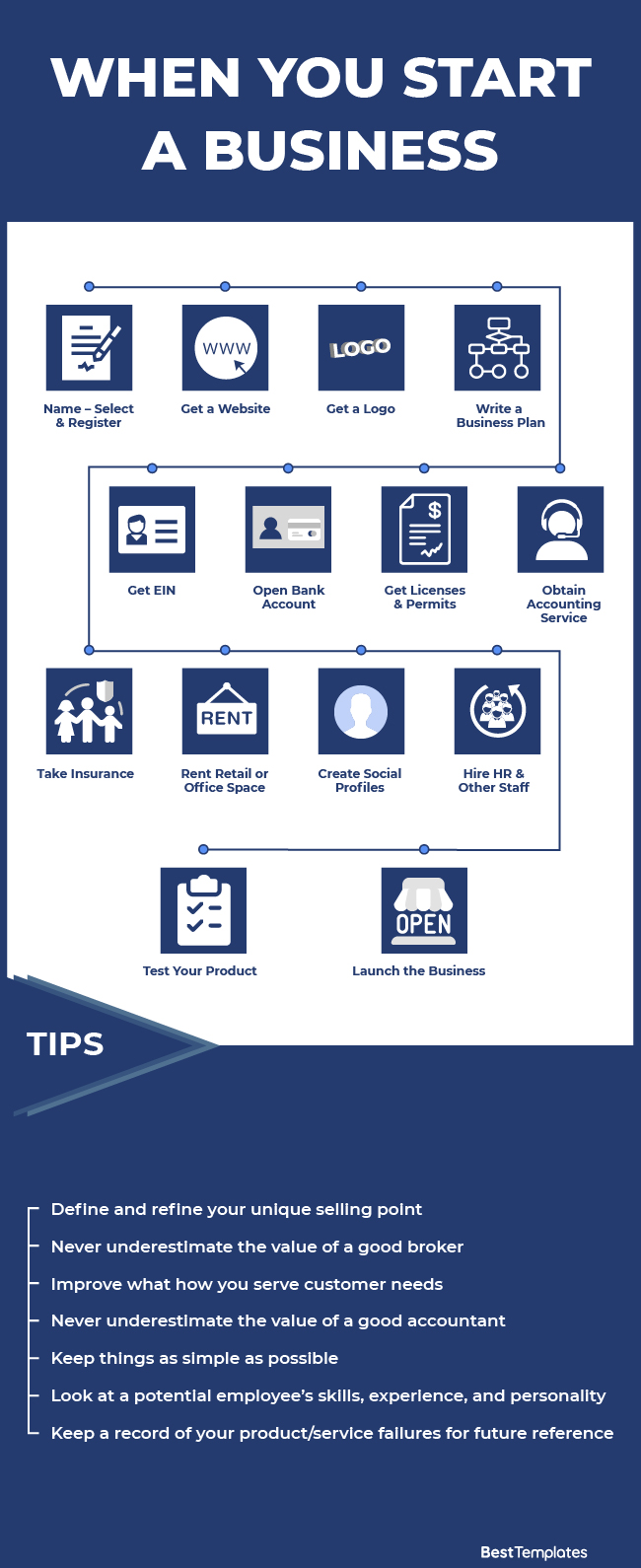
Once you have finished with the planning, now’s the time to get started with the beginning stages of your business. This will include registering the name, coming up with the logo, applying for all the necessary licenses and permits, and many more. There’s a considerable amount of work that needs to be done once you get things off the ground. Ensure that you are aware of every responsibility you have at this stage of your business.
-
Name – Select & Register
Choosing a business name isn’t always a simple process. When naming your business, you need to make sure it is appropriate and marketable. Also, be sure that whatever you pick isn’t already taken. The easiest way for business owners to register would be the filing of a DBA, also known as registering a fictitious business name. This method is most common among sole proprietors.
-
Get a Website
These days it is necessary for businesses to have websites. It not only allows you to market yourself to a broader audience, but it can help when you make business online. Creating a website for yourself doesn’t have to be a difficult task. Pick a nice website template & host it on the reliable server.
-
Get a Logo
When it comes to branding, a logo is among the most important aspects of your business. After all, it is among the most visible and memorable part for customers. Design a logo that sends the right message for your brand. Use the right colors and the appropriate imagery. Should you have any problems or concerns, it may be best to consult a branding guide.
-
Write a Business Plan
Since your business is just starting out, it helps to have a business plan in order to give you direction. When writing a business plan, remember to be as thorough as you can possibly be. Specify your plans for the marketing; your financial projects for your business; and even your strategies for the branding of the business. Plenty of business plan templates out there in the market, so you don’t have to start from scratch.
-
Get EIN
An Employer Identification Number, often abbreviated to EIN, is something you can get from the IRS. This is a nine-digit number that can identify your business specifically. The purpose for such numbers is taxes. It is needed for business owners to be able to open business bank accounts, file their tax returns, and apply for any business licenses.
-
Open Bank Account
The opening of a bank account for your business is vital for the legitimization of your idea and for tax purposes. Having a bank account makes it easier to keep track of your expenses. It can also be helpful when it comes to employee compensation, receiving and depositing payments, budget planning, and conveying your finances to your investors. Be sure to gather your loan documents and other important papers when opening an account. This will make the process much easier.
-
Get Licenses & Permits
Educate yourself on what licenses & Permits your business will need. Compile a list of licenses and permits and then comply with these one after the other. This is something that should be done much earlier than the start of your business and note that what your business needs will depend entirely on its type, what products you offer, and the state & country where you operate in.
-
Obtain Accounting Service
Hire a professional accounting service who will help you at all stages of accounting process. If you would like to do accounting by yourself, still it’s always better to take an advice from a professional, so that you would not miss anything. You can also browse online resources for quick guidance.
-
Take Insurance
Getting insurance is a responsible move on the part of any business owner. The best way would be to work with a licensed insurance agency that is reputable and experienced. You may also compile an insurance checklist, comprising of a list of insurance types that you may need and a list of licensed agents. For the latter, you can learn this through the department of insurance of your state or the National Association of Insurance Commissioners.
-
Rent Retail or Office Space
Have realistic expectations while choosing a location according to your business needs. Determine how much space you need. Decide whether to take a lease or Rent. Should you lease more space than what you require, you may end up paying more than what’s necessary. Also figure out if the layout suits all your needs, do not forget to keep expansion & future needs in mind. Hiring an experienced real estate broker can help make the selection process easier, so look for someone who is adequately experienced and reputable.
-
Create Social Profiles
The creation of a social profile for your business is an easy enough task, but one with multiple benefits. It can create social proof for your establishment, while also serving as an excellent branding avenue. Facebook, Linkedin, Twitter, and Google+ & Other platforms for your benefit include Instagram, Pinterest, Quora, and Reddit..
-
Hire HR & Other Staff
Hiring staff for your business must be done with care and a lot of thought put into it. Browse through online guides about Small Business Management. Understand what HR should do according to your business needs & hire the right one, HR would then take care about other staff hiring.
-
Test Your Product
Testing out products can determine what works and what doesn’t before putting something out for the world to see. If something doesn’t work, you will end up saving yourself from the pain of bad PR and too much costs. A great idea would be to test things out on a smaller scale. This way, you can see how it goes without having to commit a significant amount of time and money involved. Engaging in a product survey can also help out by getting feedback from your customers on what works or what they like about your product.
-
Launch the Business
Set a definitive date and promote it appropriately across your social media platforms. Ensure that everything you need has been taken care. If you remain a bit uncertain, a soft launch of the business will do. After all, it will allow you some more time to prepare for the hard launch at a later date.
-
Tips
- Define and refine your unique selling point
- Never underestimate the value of a good broker
- Improve what how you serve customer needs
- Never underestimate the value of a good accountant
- Keep things as simple as possible
- Look at a potential employee’s skills, experience, and personality
- Keep a record of your product/service failures for future reference
Running a Business
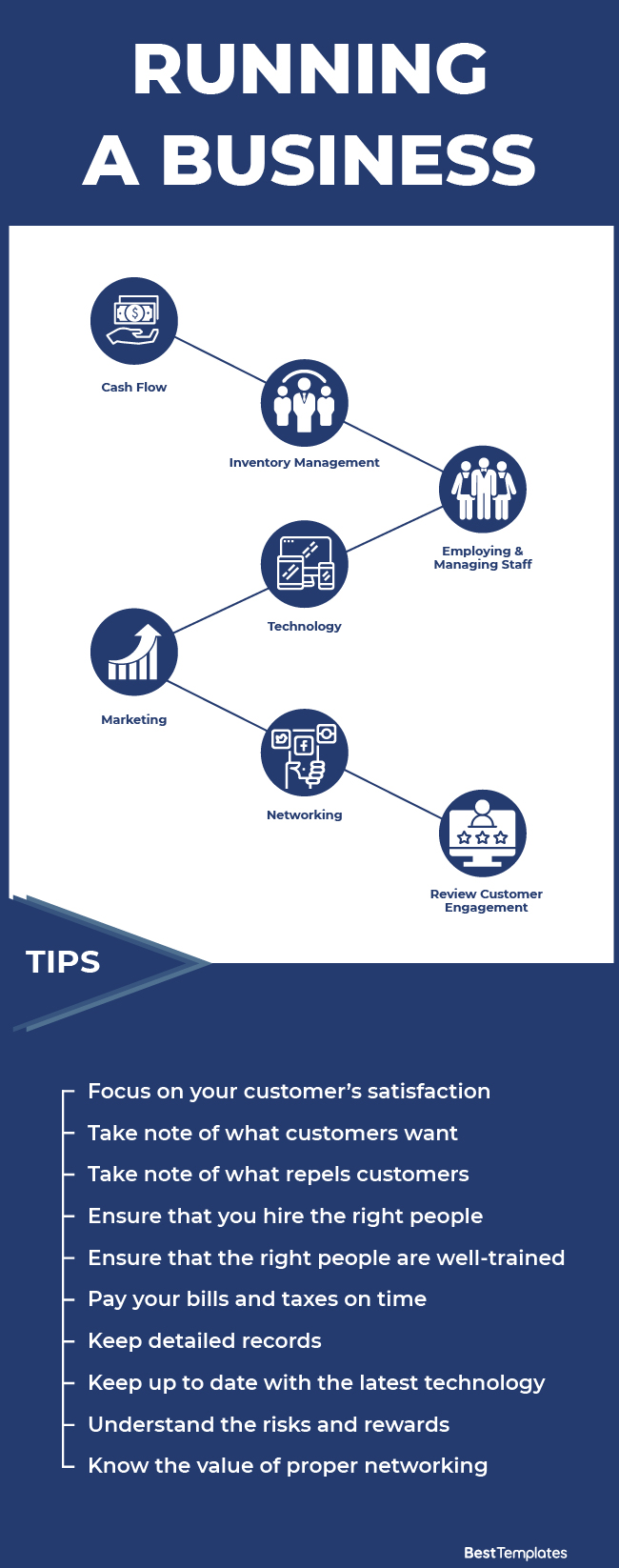
With the business successfully launched, now comes the challenge of running it on a day-to-day basis. There is much to handle from here on out: the ongoing finances that needs proper management; keeping track of the inventory; the constant managing of your staff; and the marketing of the business all need your focused attention. This can be overwhelming for anybody new to running a small business. Fortunately, there are always ways that you can tackle these tasks effectively. Here’s a look at each aspect of running a business.
-
Cash Flow
This refers to the cash amounts that are transferred in and out of the business. It is highly important since this is what determines the company’s value to its shareholders. As you run the business, you’ll be needing a cash flow statement template, as well as a daily cash sheet template, and a monthly cash flow forecast template.
-
Inventory Management
It is wise to have an inventory checklist template and an inventory sheet early on. After all, inventory management can become quite complex, especially as your business grows. Goods are typically delivered into a warehouse’s receiving area. This will be in the form of raw components or materials, which are then placed into shelves or stock areas. You will need a great variety of data just to keep track of everything, including the serial numbers, the cost of goods, its quantity, and the specific dates of the moving of said goods.
-
Employing & Managing Staff
As your business expands, you will need to hire more people to fill in new roles. Coordinate your recruitment and HR with the use of a hiring employees checklist. Once you have employed the right people, utilize an employee record template to keep track of everything from their hiring documents to their records at work.
-
Technology
The technology utilized in your business will depend on the nature of your company, your products, and your services. All the same, you need to be in the lookout for new innovations. There may be software out there that can help make the administrative part of your business much easier, for example. Or you may want to take a look at equipment that cuts production time in half. Be conscious of current technological trends and you’ll be in a better position to stay on top of your game.
-
Marketing
Marketing your business will be an ongoing part of your day-to-day duties. When you come up with new strategies, the last thing you want to happen is to lose track of it. You can prevent that by coming up with a marketing strategies checklist. To learn just how effective your marketing campaigns are, you can make use of a marketing campaign evaluation.
-
Networking
Part of marketing would be deciding which platform you will be using. A tool that can help you in making this decision is the rating marketing media template. Through this you can determine just how effective each type of network or media can be. You’ll be measuring market audience, reach, affordability, and so much more.
-
Review Customer Engagement
You need to know just how well your products and services are received by your customers. When reviewing customer engagement, you can make use of tools like a customer satisfaction survey and a customer service improvement checklist. Armed with such knowledge, you can position yourself in such a way that things will not only improve, but will do so in a more consistent manner from here on out.
-
Tips
- Focus on your customer’s satisfaction
- Take note of what customers want
- Take note of what repels customers
- Ensure that you hire the right people
- Ensure that the right people are well-trained
- Pay your bills and taxes on time
- Keep detailed records
- Keep up to date with the latest technology
- Understand the risks and rewards
- Know the value of proper networking
Buying a Business
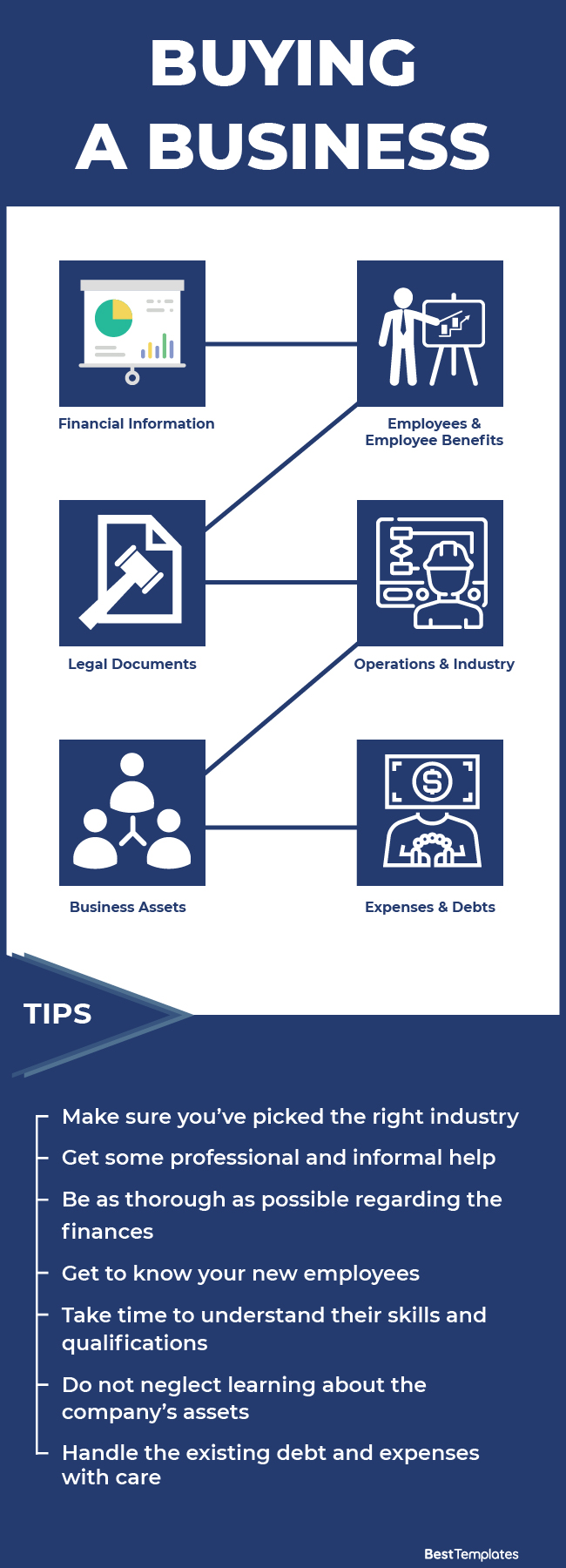
In a lot of cases, the purchasing of existing businesses poses less risk than starting with nothing. This is because of the concurrent profits and cash flow generated by the business. Other benefits include the established reputation, customer base, and the trained staff that are already familiar with how things are done. However, the downside is that buying a business can prove to be more costly. Here’s a list of the specific things you will have to deal with should you decide to go this route:
-
Financial Information
Again, a major perk of acquiring an established business would be the pre-existing finances. It is advisable that you get acquainted with its cash flow, which is made easier with a monthly balance sheet template and a quarterly balance sheet template. Knowing the company’s track record is a great place to starting planning your next move.
-
Employees & Employee Benefits
In acquiring a business, you also get its employees. Know that they already have their own company culture and ways of getting things done. Familiarize yourself with them so you can learn how to best proceed. An employee suggestion policy may help bridge any gaps between yourself and your new employees. This will encourage them to generate brand new ideas moving forward, which would aid in furthering any fresh start within the company.
-
Legal Documents
You can expect multiple legal documents when you get involved in purchasing businesses. Among these documents would be the NDA, the option to buy agreement, the letter of intent, the shareholders agreement, and the share purchase agreement. Provide yourself with more than just an overview as you prepare to deal with these documents.
-
Operations & Industry
Part of getting to know the company you purchased is to learn all about its operations and industry. Do not neglect to view the weekly operations report. As you find out more about the in’s and out’s, try to come up with your own possible production and operations management strategies. This can help inject new ideas into the business, which could lead the way for a more varied and dynamic future.
-
Business Assets
This is defined as property that is bought for the exclusive use of the business. You can categorize an asset in several ways: some may be current or non-current. Others may be viewed as short-term or long-term. Then there are assets classified as tangible or intangible, capitalized or operating. When buying a business, you’ll need to deal with an assignment of assets template, as well as an agreement of purchase and sale of business assets.
-
Expenses & Debts
Dealing with the expenses and debts of your purchased business can be made easier if you know how to track everything. Look into the annual expense report, as well as the monthly expense report and the business expense report to give yourself a greater idea of what’s in store for you. Once that’s been dealt with, you can begin planning how you can tackle these issues in ways that work out best for you.
-
Tips
- Make sure you’ve picked the right industry
- Get some professional and informal help
- Be as thorough as possible regarding the finances
- Get to know your new employees
- Take time to understand their skills and qualifications
- Do not neglect learning about the company’s assets
- Handle the existing debt and expenses with care
Selling a Business
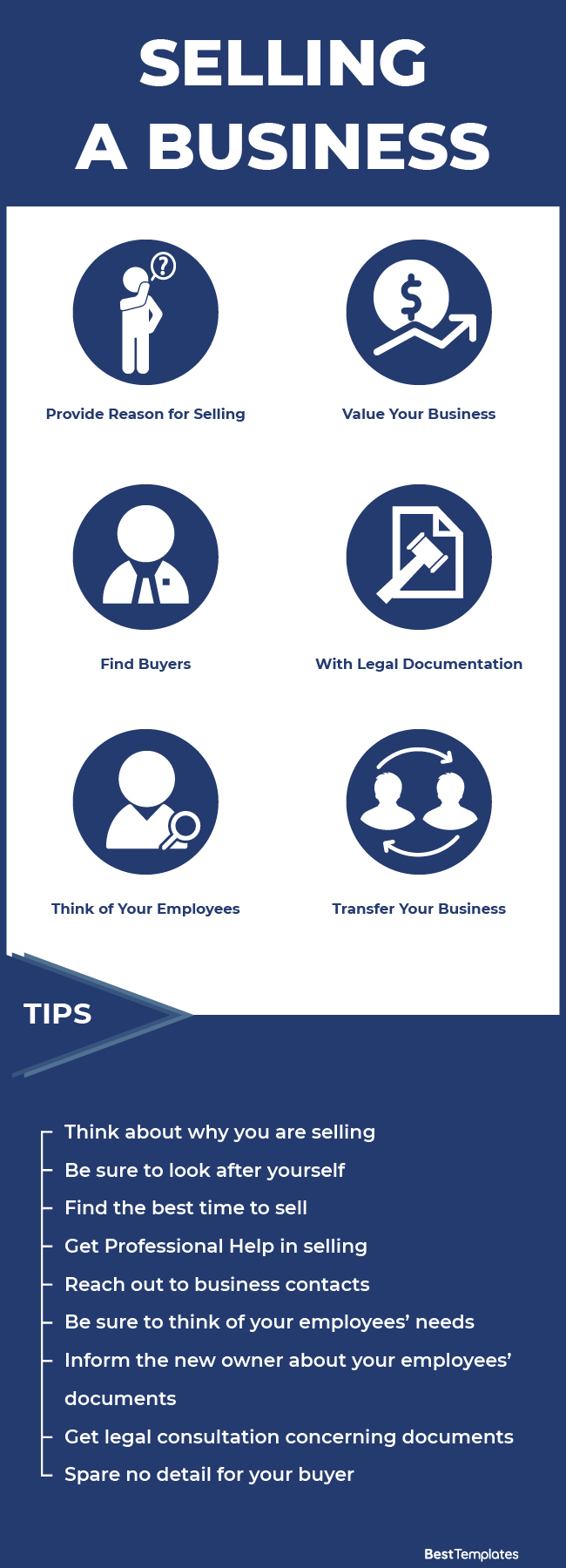
Nobody tries to build a business from the ground up with the intention of selling it somewhere down the line. Yet when time comes for you to do so, you must know how to properly sell your company and move on. There are several considerations for you to take, each one with its own significance. Here’s a closer look at what you need to know about selling your business.
-
Provide Reason for Selling
Transparency is always a good thing to promote between yourself and potential buyers. Be open with them and cite your reasons for wanting to sell the business. Doing so will let them know what they need to know about the situation and it will also make you seem like a trustworthy person, which is someone that anybody would love to do business with.
-
Value Your Business
There may be no right way to value your business, but there certainly are several wrong ways to do so. Make your estimation using various methods, then select what you think most accurately reflects your final estimate. Start things off by looking into your assets. Check out the balance sheet and try and make estimations based on your revenue. Don’t be afraid to take non-financial considerations into account as well. Have a sale of a business checklist to help you sort out the specifics of what value you think your business has.
-
Find Buyers
Before you can find buyers, you must first get a formal valuation for your business. Get a business valuation expert to take a good look at your assets and financial reports so that you can determine your value. Once that’s done, spread word of the sale. You can sell to business contacts, acquaintances, and even friends. It is worth holding a few meetings to find the right person or group to buy your business. Another way is to advertise for broader audiences. Websites, newspapers, and magazines that are geared towards what you’re selling would be great avenues for advertising. DEAL
-
With Legal Documentation
Naturally, the sale will not go into effect until you have dealt with the related legal documents. Among these documents will include the conditional sale agreement, the bulk sale agreement, and the contract for the sale of goods. Hire legal help or consult a lawyer in the event of any complications that may arise when dealing with these documents.
-
Think of Your Employees
Your employees will have two general options when you’ve sold the business. They can either choose to find employment elsewhere or they can stay behind and work for the new owner. Should they choose the latter, there are a few responsibilities for you on their behalf. First of all, you need to provide the new owner with updated employee records. Any contractual, financial, leave, and legal obligations with employees must be cleared up with the new owner as well. Lastly, you need to provide your employees with a notice of when they’ll need to sign new contracts once the transferred ownership has been finalized.
-
Transfer Your Business
With everything else taken care of, now comes the time for the transfer of ownership to come into effect. Before this can happen, you will need an agreement of transfer. This will also involve leases, as well as any licenses and permits that may still be in your possession. Only after everything has been handed over will you have successfully sold your business in its entirety.
-
Tips
- Think about why you are selling
- Be sure to look after yourself
- Find the best time to sell
- Get Professional Help in selling
- Reach out to business contacts
- Be sure to think of your employees’ needs
- Inform the new owner about your employees’ documents
- Get legal consultation concerning documents
- Spare no detail for your buyer
Closing a Business
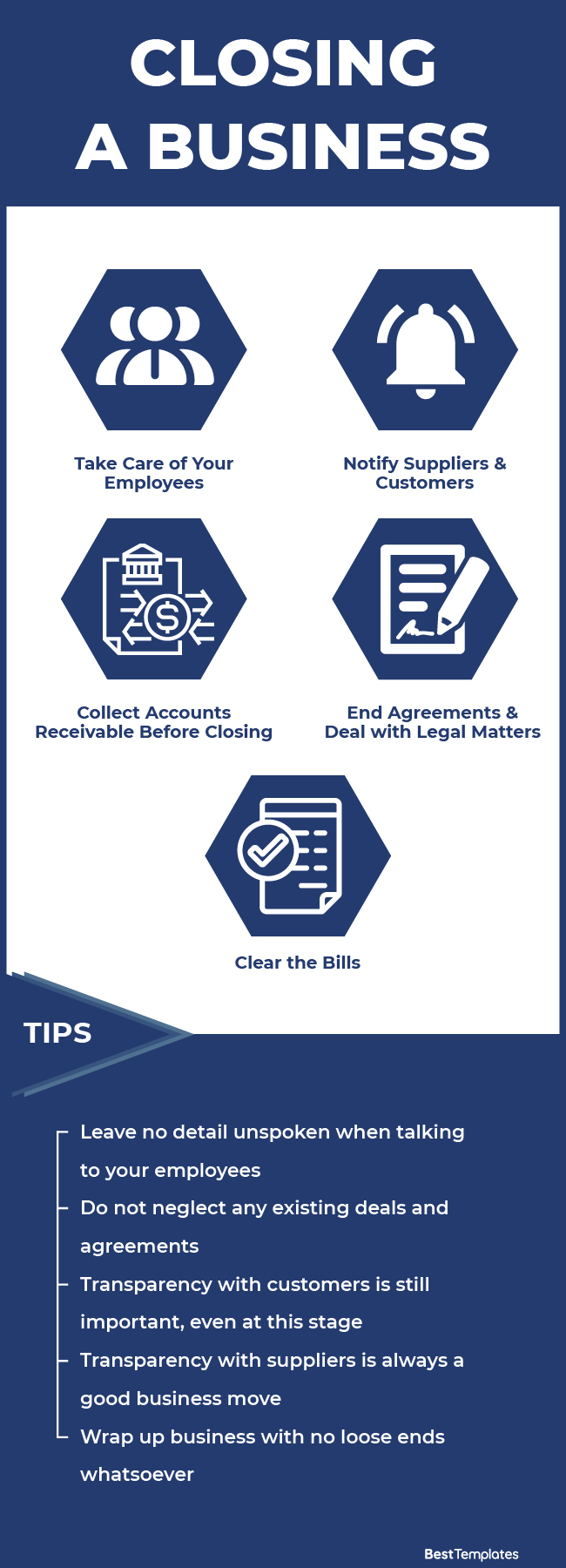
Despite best efforts, there will be times when a business will close down. Your job now is to ensure everything ends the right way. After all, you have employees to think about, suppliers and customers to reach out to, and legal matters to discuss. Here’s the specific on what you need to take care of once the decision has been made to close the business.
-
Take Care of Your Employees
Since they stuck with you until the very end, it is your responsibility to make sure your employees are taken care of. First off, communicate with them about why the business is closing and when it will be effective. Through this discussion, you can address any questions or concerns they may have. Next, ensure that any undetermined or unresolved issues with employee benefits be resolved during the transition period. Looking through your small business employee documents should help with that greatly.
-
Notify Suppliers & Customers
Besides your employees, you’ll also need to inform both your suppliers and customers about the closure of your business. Reviewing your product supply contract with suppliers needs to be done to ensure that both parties have fulfilled their respective obligations. Informing your customers is a necessary courtesy. You can do this by announcing it on your website or social media platforms.
-
Collect Accounts Receivable Before Closing
Even without the closing of a business, it is important to ensure the timely collection of your accounts receivable. It may be seen as something only the collections department can use, but in truth, it can be a company-wide effort. The utilization of an assignment of accounts receivable template would prove quite useful with this endeavor.
-
End Agreements & Deal with Legal Matters
With things coming to an end, you need to end whatever existing business agreements you may have with others. Doing this would also mean dealing with potential legal issues that are in play. Take time to sort this out before the effective end date of the business.
-
Clear the Bills
Lastly, you still have bills to deal with. With your operations ceasing, this will be the last time to pay up, so look into the bill payment schedule and ensure everything is paid up. This can come hand in hand with the pre-existing deals mentioned above.
-
Tips
- Leave no detail unspoken when talking to your employees
- Do not neglect any existing deals and agreements
- Transparency with customers is still important, even at this stage
- Transparency with suppliers is always a good business move
- Wrap up business with no loose ends whatsoever
As you can see, there are numerous hurdles placed in front of you whenever you decide to engage in any aspect of business. No matter how difficult things get, know that there are always solutions and ways to get out of certain situations. Keep yourself informed and you can stay one step ahead of every trial.
